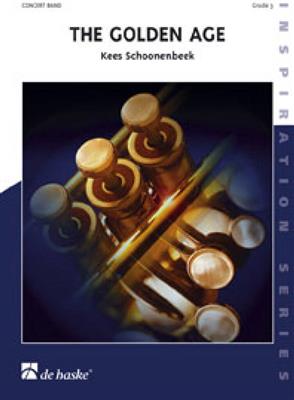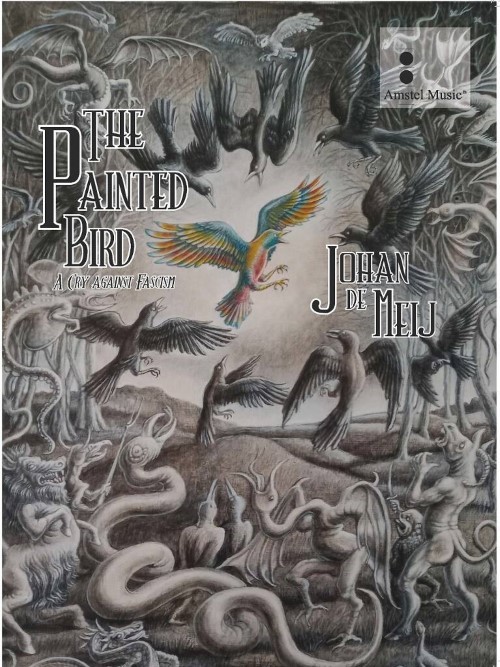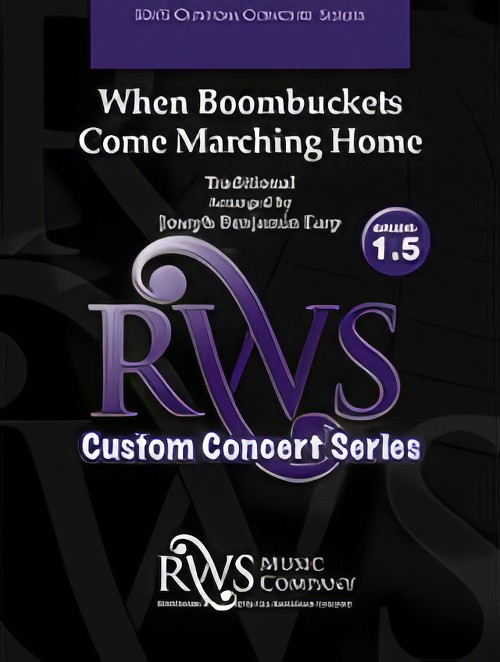Results
-
 £69.99
£69.99Hectala - Willy Fransen
Hectala is the historical place name of the Belgian-Limburgish village of Hechtel where, during the Second World War, the Welsh Guards were engaged in a five-day battle with the German troops. More than 200 soldiers and 35 inhabitants perished. This classical, steady march in 6/8 time was written as a memorial to these events. It sends a powerful message that in war, there are no winners.
Estimated dispatch 7-14 working days
-
£134.99
Recalls - Ben Haemhouts
Recalls obviously refers to memories. This piece of music is in fact a series of flashbacks, however, it does not highlight the actual memories of specific thoughts, people or events.The composition evolves around the late Frans Steurs, who for manyyears was the inspirational artist behind the brass band that is currently commissioning this work. The main theme of the work is based on the name STEURS". E = mi, U = do, R = re and S = "si" which is Dutch for the note "ti". This idea forms themusical theme for the entire composition and different variations are used throughout. The structure of the work is based on the concept of a story which father Steurs is telling his two daughters, who play the flute and the clarinet. Each part ofthe work has a story-like character:1. Introduction: following a short ominous intro, the main theme is presented for the first time.2. The Story: father Steurs has both his daughters on his knee and he tells them stories from the old days. Trumpetsand trombones play variations of the theme. The story gets very exciting (accelerande, poco a poco agitato) until the tale takes a dramatic turn when the father tells an exciting story at the time of the Second World War. He tells of being hunteddown by the occupying army and these adventurous episodes are related to us musically in part3. Danger, with its skilful references to "vor dem Sturm" from "Eine Alpensinfonie" by Richard Strauss.4. called Fugitives, is about how he fled in the nightfrom the enemy and this is reflected in the bass tones of a new theme. The aggression of the war is illustrated from bar 117 onwards, by a harsh brass section. The main theme is repeated once again and this time up-tempo. The second theme is broughtonce again from bar 149 onwards.5. Dialogues, depicts the conversations between the two daughters and their father. Father speaks (bar 155); the daughters answer (bar 164 - flute, bar 166 - clarinet); bar 178: father answers with the tune of the maintheme to the two daughters. The discussions gradually intensify but ultimately end in peace in the last part called Conclusion.The piece of music "Recalls" is a free interpretation by the composer who consulted the letters between the two daughtersof Steurs and their father and in this respect it is not really music for a programme."
Estimated dispatch 7-14 working days
-
 £139.99
£139.99The Golden Age - Kees Schoonenbeek
The Golden Age is a programmatic composition in four movements. I Overture For the Netherlands, the seventeenth century was a period of great flourishing in the fields of economy, culture and politics; thus it is called the Golden Age. Overseas trade boomed, and the Dutch East India Company (known as the VOC by the Dutch) was founded and expanded to become a powerful -and, at the time - modern enterprise. II Adis espaoles!(Farewell, Spaniards!) In 1567, the Spanish army invaded, led by the Duke of Alva. There was a fierce resistance against the Spanish tyranny; toward the end of the sixteenth century, the Dutch proclaimed theRepublic. However, the Spanish continued the war. Only with the Treaty of Mnster in 1648 did the Dutch get their much sought-after independence. This was also the end of the Eighty Years' War. III Rembrandt's Night WatchThe field of culture, particularly literature, painting, sculpture, architecture, the art of printing, and cartography developed fast. It was in the Golden Age that the celebrated painter Rembrandt van Rijn created his famous Night Watch. IV The Admiral Overseas trade entailed the colonization of large areas in Asia, from where precious products that yielded lots of money were brought in. Surrounding countries were also involved in such practices. Colonizers poached on each other's territories in the literal and figurative sense - in this context the Anglo-Dutch Sea Wars are legendary. The fourth movement starts with the English patriotic song Rule Britannia, after which the Dutch Admiral Michiel de Ruyter makes the English change their tune; one can even hear the roaring of cannons. When the smoke of battle has cleared, a small fragment of a Dutch song about Michiel de Ruyter appears, followed by a fitting closing.
Estimated dispatch 7-14 working days
-
 £104.50
£104.50Legend Of Wilson's Creek - David Gorham
This programmatic work was commissioned by the Republic, Missouri High School Band. The title refers to a battle that took place at Wilsons Creek near Springfield, Missouri early in the Civil War. The music is based on the traditional tune Johnny Has Gone For a Soldier, which was a popular song during both the Revolutionary and the Civil Wars. The song is a womans lament for her man who is going off to war. The piece begins with a plaintive quiet section which developes and builds, evolving into an exciting fast section.
Estimated dispatch 7-14 working days
-
 £134.99
£134.99Suite from Miss Saigon - Claude-Michel Schönberg
The musical Miss Saigon was a massive hit in London, Broadway and throughout the world. Based on Puccini's opera, Madame Butterfly, this epic production centers on the romance between a strong-willed Vietnamese woman and an American soldier during the Vietnam War. The story tells of two young lovers torn apart by war yet still held together by a burning passion. This medley features three of the best songs from the musical and mixes desperate love with optimism and joy. Relive the hit show with this catchy medley.
Estimated dispatch 7-14 working days
-
 £137.99
£137.99Virginia - Jacob de Haan
This expressive piece depicts three periods that play an important role in the history of the American state of Virginia, the colonization, slavery, and the American Civil War. The first movement describes the adventures and hardships of the first colonists through lively American sounding themes.The expressive slow movement, in which a melancholic minor theme forms the starting point, depicts, with clever use of blues elements, the oppressed slaves on the tobacco plantation. This is followed by a illustration of the Civil War, heralded by ceremonial figures from the brass section. The work is brought to a close with a slow but optimistic theme heralding hope for the future.
Estimated dispatch 7-14 working days
-
 £84.99
£84.99Eventide - Jacob de Haan
Eventide (Song of Liberation) has as its theme the European liberation from the Second World War. After a solemn introduction, one hears the melody of the hymn Abide with Me, which was sung frequently during the war. Variations on the theme follow, finally leading to the magisterial conclusion that represents the ultimate liberation. Bring a bit of nostalgic history to life with this stirring composition.
Estimated dispatch 7-14 working days
-
 £237.99
£237.99Symphonic Requiem - James Barnes
Commissioned for the United States Army Band to commemmorate the 150th anniversary of the America Civil War, the work combines two massive structures into one: a requiem and a symphony. It portrays the heartbreak of three of the most dramatic battles of the war, concluded by an apotheosis, a hymn of respect and praise for the 668,000 soldiers, Confederate and Federal alike, who gave their lives during this monumental conflict. Dur: 28:00
Estimated dispatch 7-14 working days
-
 £189.00
£189.00The Painted Bird (Concert Band - Score and Parts) - De Meij, Johan
A Cry against FascismThe Painted Bird, the controversial novel by Jerzy Kosinski (1933-1991), tells the story of a Jewish boy during World War II. For his safety, the child was sent to the Polish countryside by his parents. The title refers to a barbaric tradition among Polish farmers. The wings of a captured bird were painted in bright colours, after which the animal was released. Almost immediately, the bird was attacked and pecked to death by its peers. The boy underwent the same fate. Wherever he wandered, the local rural people cruelly mistreated him because of his distinctly different appearance. However, he survives the horrors and is reunited with his parents after the war. To escape the yoke of the Soviet occupation in his country, the Polish-Jewish Kosinski emigrated with counterfeit papers to the United States in 1957, where he became an American citizen in 1965. His landmark novel The Painted Bird was translated into thirty languages and sold millions of copies. Plagued by illness and accusations of betraying his country and plagiarism the writer ended his life in 1991.Duration: 11.00
Estimated dispatch 7-14 working days
-
 £55.00
£55.00When Boombuckets Come Marching Home (Flexible Ensemble - Score and Parts) - Earp, Joseph Benjamin
A well-known patriotic song from the American Civil War to welcome home loved ones fighting in the war, When Johnny Comes Marching Home has been skilfully arranged for young bands to feature the percussion section using Boomwhackers and plastic buckets. We know you will enjoy this exciting arrangement as we feature our guest artists from the percussion section!
Estimated dispatch 7-14 working days
